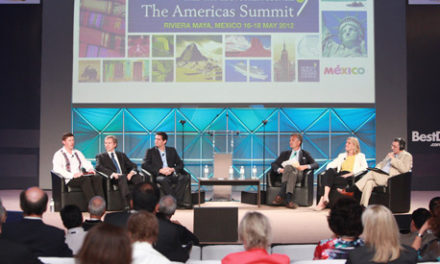
Hilton Chicago executive chef Mario Garcia speaking about the importance of incorporating sustainability across all food service operations at Hilton Chicago during PCMA Convening Leaders (January 12, 2015). © 2015 Rob Hard
Whether your interest is to travel and attend a meeting or to plan one, sustainability is now an expectation for our travel suppliers — and they’re stepping up to our expectations.
Hilton Worldwide just launched “Meet With Purpose,” a new program targeted to meeting professionals that builds on the success of “Travel With Purpose,” its approach to corporate responsibility and sustainability that aims to deliver value to businesses, guests, franchise and business partners and communities.
Hilton also announced its “Mindful Eating” initiative, which complements the Meet With Purpose initiative by supporting healthier habits, less waste and better experiences. They make the following ideas common practice:
Paper/Plastic Usage
- Paperless check-in/checkout and use of e-proposals and e-contracts
- Notepads upon request
- Meeting room recycling where available
- Water and other beverages served in pitchers or glassware
Food-waste Reduction
- Pre-plated salads and desserts
- Common-area food and beverage service
- Single-serving snack breaks
- Extra food donation to local charity
Energy Consumption
- Energy-efficient light bulbs
- Thermostats with room-occupancy sensors
- Best energy practices for rooms not in use
Sustainable Practices
- Eco-friendly cleaning products
- Water conservation for linens, towels, plumbing and more
- Calculator to determine meetings sustainability impact
Local and Global Impact
- Team-building exercises with local charities
- Soap recycling to support global health
Hilton’s ‘Mindful Eating’ Tips for Meetings and Events
- Pre-plate salads or desserts
- Set-up common area food service
- Provide single-serving snack breaks
- Substitute fresh, seasonal fruit for dessert
- Source local ingredients
- Incorporate whole foods — fresh fruits, vegetables and nuts
- Substitute bottled teas and vitamin-infused water for sodas
- Provide fresh water stations with reusable containers
Hilton Executive Chefs Embracing Sustainability

The rooftop garden at Hilton Chicago where herbs and produce are grown throughout the spring and summer. Courtesy image
Each of Hilton’s properties seem to be embracing these ideas for sustainability and taking their efforts to the next level.
At Hilton Chicago, for example, executive chef Mario Garcia has a rooftop garden with 84 planters to grow herbs, tomatoes and peppers. And he plans to double this to have 160 planters this year (guests and groups will be allowed to tour the garden). He has also partnered with nearby farms to grow produce for the hotel.
Executive Chef Bernard Fiemeyer at Waldorf Astoria Orlando also incorporates responsible sourcing while promoting healthy eating options. In fact, chef Bernard maintains close relationships with his nearby farmers and visits them each week to select produce each week (promoting the farm-to-table philosophy whenever possible).
Commentary: For some time now it has been my view that the tourism and hospitality industries need to move beyond what I consider to be the guilt tax of carbon offset credits (useful as they may be) and toward a perspective that allows our global suppliers to fully embrace corporate responsibility and sustainability as part of their day-to-day and annual business practices. And that’s been happening. Hilton, for example, has already achieved a 13.6% reduction in energy use, a 20.2% reduction of carbon output, a 26.8% reduction of waste output and a 13.1% reduction of water use. As hotels and others continue to change their footprint, the carbon offset credits should become a lower priority — unless an organization is fully committed to ensuring that the beneficiaries of those dollars and their related projects will be funded from start to finish.




